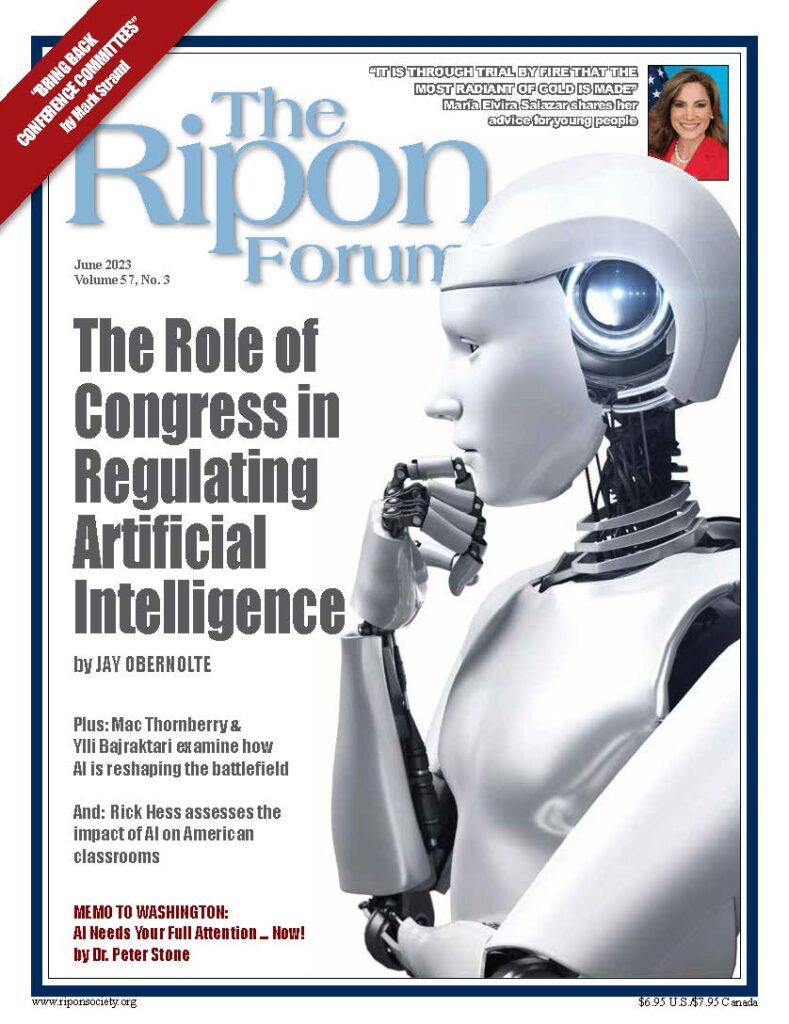Latest Ripon Forum Examines how AI Will Impact our Lives & Whether Washington Should Put Guardrails Around its Development

WASHINGTON, DC — With each new week seeming to bring another new advancement in artificial intelligence, the latest edition of The Ripon Forum examines the role of Congress in regulating AI and how our lives and our world may be reshaped and impacted in the years ahead.
Leading the Forum’s coverage of this issue is Jay Obernolte. The U.S. Representative from California’s 23rd Congressional District, Obernolte is an entrepreneur and computer scientist who has spent the past 30 years running his own video game development company. He is also the only member of Congress with a graduate degree in AI.
“As Congress begins to tackle the issue of artificial intelligence,” he writes in the lead essay for this edition, “it is vital that we maintain the agility of our technology and strike a careful balance between protecting consumers and protecting innovation … In Europe, legislators in the EU have moved too aggressively, abdicating their decision making on AI to a bureaucracy and passing regulations on data privacy that stifle innovation by focusing on mechanisms instead of on outcomes.”
“Some countries in Europe have gone even further, arbitrarily halting the development of artificial intelligence within their borders and allowing the rest of the world to progress while they lag behind. This tactic would be particularly harmful in the United States, where China is already seeking to use artificial intelligence to manipulate public opinion, attack our cyber defenses, and profile American citizens.”
According to Mac Thornberry and Ylli Bajraktari, China’s aggressive pursuit of acquiring AI is one reason why the U.S. cannot sit back and take a more passive approach. Thornberry is the former Chairman of the House Armed Services Committee, while Bajraktari is the President & CEO of the Special Competitive Studies Project. In an essay entitled, “How AI is Reshaping the Battlefield,” the pair write that: “Data, advanced algorithms, computing power – these are the weapons that will determine the fight for information. And it’s a fight the U.S. must win.”
“The Chinese Communist Party is obsessed with information in modern warfare and has unabashedly touted the military advantages of AI which it sees as central to moving from today’s ‘informationized’ ways of warfighting to future ‘intelligentized’ warfare.” Unfortunately, they continue: “The Department of Defense has been slow to integrate AI. This will leave the Joint Force disadvantaged in any future information contest against a Chinese military relentlessly pursuing intelligentized warfare.”
In another essay for this edition, Rick Hess of the American Enterprise Institute examines how artificial intelligence will impact American lives closer to home — more specifically, in the classroom. “The plain truth,” Hess writes, “is that — whether the subject is division, Dante, or driving — AI makes it easy for learners to show proficiency without ever mastering essential knowledge or skills.” The result, he continues, is that teachers will have to change their approach to instruction. “Teachers will need to bring writing back into the classroom, where they can observe the writing process and engage with students. They’ll need to check in with students at each stage of the writing process, as they develop a thesis, frame arguments, identify sources, and so forth. There will be a place for more oral presentations. And all this is good!”
In other essays examining the impact of artificial intelligence on our lives, Jonathan Gifford, the director of the Center for Transportation Public-Private Partnership Policy, examines how AI is reshaping transportation in the United States, while ChatGPT — the artificial intelligence Chatbot that revolutionized the field when it was released late last year — provides its own assessment of how AI will reshape lawmaking in Congress. And in a “Memo to Washington,” Dr. Peter Stone of the University of Texas — who signed a letter calling for a six-month halt on AI-related research — urges lawmakers to give their full attention to the issue given the accelerating rate of technological advancements.
Also featured in this latest edition of the Forum is an essay by veteran legislative expert Mark Strand, who recently stepped down as President of the Congressional Institute and writes about the importance of House-Senate conference committees and why their role in the legislative process should be restored. With illegal immigrants continuing to stream across America’s southern border, David Haines of George Mason University and Lora Ries of the Heritage Foundation square off in a debate over immigration policy and whether America should continue to accept asylum seekers. And in the latest Ripon Profile, U.S. Rep. María Elvira Salazar discusses, among other things, how her career in journalism has shaped her service on Capitol Hill.
The Ripon Forum is published six times a year by The Ripon Society, a public policy organization that was founded in 1962 and takes its name from the town where the Republican Party was born in 1854 – Ripon, Wisconsin. One of the main goals of The Ripon Society is to promote the ideas and principles that have made America great and contributed to the GOP’s success. These ideas include keeping our nation secure, keeping taxes low and having a federal government that is smaller, smarter and more accountable to the people.



